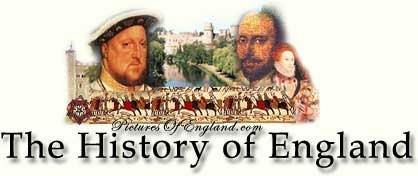 England is the largest of the countries that today make up the United Kingdom. The name England comes from the Anglo-Saxons who arrived in the 5th century. The territory of England has been united as one country since the 10th century. This article is about the history of that territory until 1707, when Britain (England and Wales) was joined with Scotland to make Great Britain.
England is the largest of the countries that today make up the United Kingdom. The name England comes from the Anglo-Saxons who arrived in the 5th century. The territory of England has been united as one country since the 10th century. This article is about the history of that territory until 1707, when Britain (England and Wales) was joined with Scotland to make Great Britain.
Archaeology shows that people came to southern England long before the rest of the British Isles, probably because of the friendly climate between and during the ice ages of long ago.
Julius Caesar invaded what is now England in 55 and 54 BC, as part of the Gallic Wars, and was defeated. He wrote in De Bello Gallico that there were many tribes there, very similar to other Celtic tribes in Europe. Coins, and later Roman historians, have given us the names of some of the rulers of the tribes, and what they did.
In 43 AD, Claudius successfully invaded England with 40,000 soldiers landing at Gaul at Richborough, Kent.
For hundreds of years, what is now England was a Roman province, Britannia. The Romans later gave up on the province and left the Celtic people on their own as the Roman Empire began to fall apart. The influence of the Romans meant that the territory of England had already experienced unity before the Anglo-Saxons arrived.
England during the Middle Ages
Picture of the Battle of Hastings (1066) on the Bayeux Tapestry
The defeat of King Harold Godwinson at the Battle of Hastings in 1066 against Duke William II of Normandy, later called William I of England, and the following Norman conquest of England caused important changes in the history of Britain. William ordered the Domesday Book to be written. This was a survey of the entire population, and their lands and property, to help in collecting taxes.
William also ruled Normandy, then a powerful duchy in France. William and his nobles spoke, and held court, in Anglo-Norman, in Normandy as well as in England. The use of the Anglo-Norman language by the aristocracy was kept up for centuries, and had a great influence on the development of Old English into Middle English.
In England, the Middle Ages was a time of war, civil war, rebellions from time to time, and many plots among the nobles and royalty. England had more than enough cereals, dairy products, beef and mutton. The nation's international economy was based on the wool trade, where wool from northern England was sold to the textile merchants of Flanders to make into cloth. Medieval foreign policy was also shaped by relations with the Flemish cloth business. An English cloth business was developed in the fifteenth century, allowing the English also to become wealthier.
In the reign of Henry II, the king got some power back from the barony and the Church. Henry's successor, Richard I "the Lion Heart", took part in the Third Crusade, and defended his French territories against Philip II of France. His younger brother John, who followed him as king, was not so lucky; he lost Normandy and many other French territories. In 1215, the barons led an armed rebellion and forced him to sign the Magna Carta, which put legal limits on the King's personal powers.
The reign of Edward I (1272–1307) was rather successful. Edward strengthened the powers of his Government, and called the first English Parliament. He conquered Wales. His son, Edward II, lost the Battle of Bannockburn against Scotland.
The Black Death, an epidemic that spread over all of Europe and parts of Asia, arrived in England in 1349 and killed perhaps up to a third of the population.
Edward III gave land to powerful noble families, including many people with royal blood. Because land was like power in these days, some powerful men could now try to claim the Crown.
Hi! I am a robot. I just upvoted you! I found similar content that readers might be interested in:
https://simple.wikipedia.org/wiki/History_of_England
Downvoting a post can decrease pending rewards and make it less visible. Common reasons:
Submit